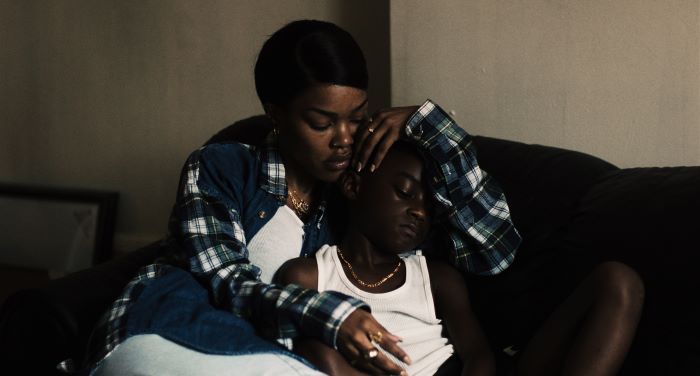Anchored by a bold, fully embodied performance by Teyana Taylor, writer/director A.V. Rockwell’s A Thousand and One is a mesmerizing New York City–set family drama with underlying complexities. Taylor stars as Inez, recently out of Rikers Island, who comes back home to the city. Her six-year-old son, Terry (Aaron Kingsley Adetola), is in foster care, during which, its insinuated, he fell out of a window with minor injuries. Out of a sense of impulsivity, protection for Terry, and her circumstances of having no family left of her own, Inez takes the boy from the hospital, hides out a bit with a friend, and then starts a new life for the two of them in Harlem.
The film is initially entrenched in 1994 in style and aesthetic: Inez walks the streets in her gold hoop earrings and denim, snacking on sunflower seeds. These scenes, shot in radiant colors by Eric K. Yue, were photographed with vintage lenses and filters. It is reminiscent of John Singleton’s Poetic Justice and its vibrant cinematography by Peter Lyons Collister, and the work of Ernest R. Dickerson and cinematographer Larry Banks on 1992’s Harlem-set Juice. As Inez struggles to balance work as a janitor in Queens and the care of Terry, the boy is shown at one point left alone, languidly spending a sun-blazed afternoon on the floor into early evening in a bare, hardwood-floor living room, listening to cassettes or watching daytime TV. So detailed and specific is this era of Inez and Terry’s lives that it seems trapped in amber, but the story continues in a bold fashion, spanning over a decade from 1994 to the mid-2000s as we watch their bond develop and fray.
Somewhere towards the end of the ’90s, Inez strikes up a relationship with Lucky (Will Catlett), who eventually emerges as a sort of unwilling father figure for Terry. The film wavers between the point of view of Inez and Terry, especially as Terry grows into a young man. He is played by three excellent actors, Adetola (at 6), Aven Courtney (at age 13), and Josiah Cross (17). As he ages, Terry becomes more aware of Lucky’s relationship with his mother and the world around him. Throughout, gentrification and the shifting changes throughout the eras are alluded to through audio of Mayor Rudy Giuliani, his stop-and-frisk policies, and Mike Bloomberg’s broken windows policies. By the beginning of the early aughts, hammering and construction sounds begin all around Inez and Terry. White building owners emerge ominously, seemingly benign, but insidiously underhanded in their methods of forcing out Black tenants—the squeezing of Inez and Terry’s predicament is palpable.
In fact, life seems drained out of Inez. She is still feisty and determined, but there’s a lack of boisterousness that’s been shadowed with rampant unease and bitterness. Much of these sentiments are matched by the eventual washed-out, grayish look of the movie (akin to the situations at hand) and Taylor’s committed performance. A breaking moment for Inez and Terry has Taylor delivering a monologue mixed with regret and anger, as she smokes away at a Newport with poetic flair.
Rockwell’s script and direction is nuanced and strong. Her work is aided by the forward movement of the film, an unexpected sweep for what is mostly a two-character study. (The editing is by Sabine Hoffman, who cut Rebecca Hall’s Passing with similar juxtapositions and unexpected time jumps, and Kristan Sprague.) Gary Gunn’s rich, symphonic score creates a similar feeling of the grandiose as a backdrop to the intimate as well. The film may run long, but it is refreshing to see its actors, especially Taylor, be given the space to allow for such dynamic and vibrant performances.

















Leave A Comment